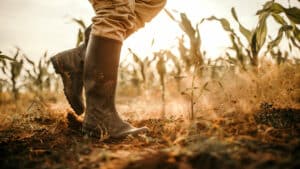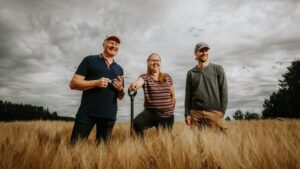Brenda Tjaden is well-known in ag circles. As co-founder of FarmLink Marketing Solutions, she spent years in the world of grain marketing, farm management and communications.
Two years ago, she struck out on her own to discover a new career path — one that led her to form a company called Sustainable Grain, which is set to hold the first Canadian Summit on Climate Actions in Food Systems.
To be held Oct. 20-22, 2019, in Kelowna, B.C., its purpose is to create a “safe place” for stakeholders to explore the trends in global agriculture that threaten some models of farming and food distribution, and also to share information on the fast-growing movement of regenerative agriculture and how it addresses the modern challenges of the planet.
“Regenerative agriculture is often perceived as being disruptive to current business models, so it doesn’t get talked about a lot among people involved in mainstream ag, especially the seed industry,” Tjaden says.
Hence the idea of creating a safe space in which industry stakeholders can talk about it without fear of recrimination, she says.
Tjaden has a long history helping western Canadian farms respond to emerging profit opportunities in growing and marketing their crops. In the process of founding Sustainable Grain, she researched sustainability protocols and the organic value chain, their opportunities and vulnerabilities. She also pursued an education in soil health and regenerative agriculture — both of which go hand-in-hand and have become a passion for her.
Regenerative agriculture is a conservation and rehabilitation approach to food and farming systems focusing heavily on topsoil regeneration. It counts intercropping and cover cropping — both becoming increasingly popular — as two farming methods that fall under its umbrella.
[tweetshare tweet=”My personal interests take me to food. I’m not interested in big yields or commodity agriculture anymore.” username=”germinationmag”]”It really focuses on making farming more sustainable. That’s become a loaded word these days, but at its core it really helps us to think about the future and what is going to work over the long term. There are so many things about today’s agriculture that simply are not sustainable, herbicide resistant weeds and nine-dollar canola being two big ones,” Tjaden says.
“What do we do different? What do we do besides monocrop canola and rotate herbicides and invest in even more expensive seed technology? That’s why I wanted to create this event, which really looks past all the controversy that surrounds topics like this. This isn’t about trying to get the industry to change by throwing out pie-in-the-sky ideas and lecturing people about sustainability. It’s about the future of farming and seed, and that’s food.
“My personal interests take me to food. I’m not interested in big yields or commodity agriculture anymore. There are a lot of emerging opportunities in food and the value chain that conventional agriculture can take advantage of, and that’s what this is about — trying to connect industry stakeholders to all different kinds of farmers and end users so we can begin this conversation,” says Tjaden.
Seed as Food
Tjaden sees a future where seed varieties — cereals in particular — have customer-facing traits bred into them like specific flavours and textures, effectively turning seeds into miniature powerhouses that provide end users with exactly what they are looking for.
“That’s not always easy to pull into a food product once it undergoes processing and everything else. If we breed with those preferences in mind, we come a step closer to really giving everyone what they want — right from the seed company to the farmer to the processor to the consumer,” Tjaden says.

Enter people like Shane Paterson, vice-president of Growers International Organic Foods, an affiliate of Paterson GlobalFoods. He will speak on the topic of emerging markets for identity-preserved value claims. According to Paterson, there is space for everyone in modern agriculture, but the current supply chain may be overlooking opportunities to create incremental value for the crops being grown, and the farming practices being implemented.
“Different seed and plant varieties have different characteristics with different nutrient and flavour profiles, different regional characteristics. We see that in things like malting barley and hops,” Paterson says. This focus causes a shift from grain as a commodity, to grain as an ingredient, he says.
“There are a lot of opportunities that stem right from the genetic level. If you have a variety with better nutrient content and better flavour profile that could hit it big in a certain market, are you ultimately doing it a disservice by co-mingling it with other varieties in the class and letting it be just a commodity?”
Paterson says the seed industry and all of agriculture are starting to begin thinking of new ways to do business — and that’s where identity-preserved systems like organic farming and regenerative agriculture fit in.
“Farm incomes are at all-time lows and there’s no way to differentiate yourself in the marketplace except for the generic quality characteristics of the crop you grow,” he adds. “Identity preserved value claims create opportunities to move beyond just the generic quality of the crop, by focusing on the intrinsic characteristics and the identity of the crop.”

Of course, no crop can grow without a growing medium like soil, and one of the goals of regenerative agriculture is to restore soil health, a message Ananda Fitzsimmons will deliver. As president of Regeneration Canada, she will be part of a panel discussing how to positively influence Canadian agricultural practices. Prior to forming Regeneration Canada, Fitzsimmons co-founded Inocucor (now known as Concentric Ag) which commercializes agricultural products based on naturally occurring microorganisms.
“Dominant agricultural practices are based on the concepts of agronomy, which itself is based on chemistry being delivered to the plant. Thankfully, there’s a kind of revolution going on in terms of biology — we have new scientific discoveries not available at the time most conventional ag methods were developed,” she says.
Those discoveries have to do with the soil microbiome, she notes. Soil isn’t just a medium to hold the plant upright while farmers deliver nutrients. Soil is a complex ecosystem and the basis of life is the soil microbiome. But Fitzsimmons cautions that regenerative agriculture is not about going back to primitive farming methods.
“The future of agriculture is about understanding the natural process of the soil ecosystem and looking at how to optimize it, but that work has never been done. There are billions of organisms in there that work in synergy and nature’s design was to recycle nutrients and deliver them to the plant. Regenerative agriculture is about restoring the ecosystem functions of living soil, trying to understand and optimize those processes and allow the microorganisms to do their work.”
But Paterson cautions that it will take time, and a good dose of practicality, to revolutionize the agriculture industry for the years ahead.
“While we all have ideals that we want to shoot for, reality has to fit into the picture. People don’t change farming practices for the good of the world if it means their family isn’t going to eat. I see opportunities at events like this for connecting producers and consumers through a value chain that justifies changes in behaviour that might benefit the environment.”
For information on the first Canadian Summit on Climate Actions in Food Systems including an agenda, visit sustainablegrain.ca












